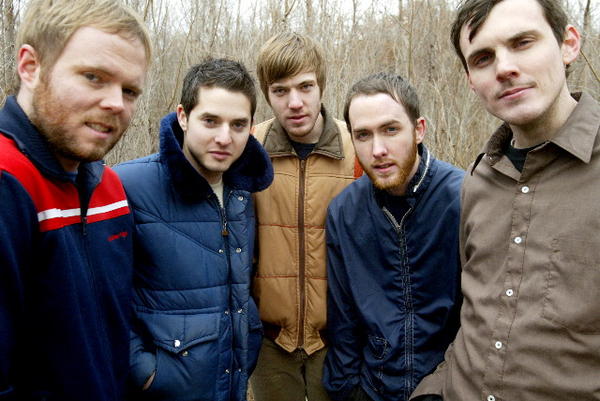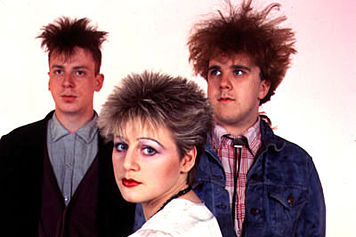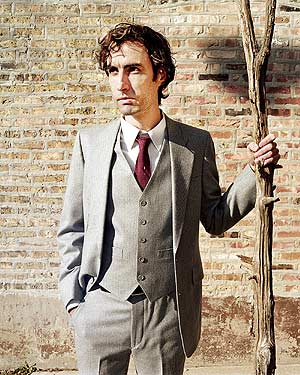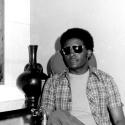Simon Raymonde's Bella Union label occupies an enviable position within the music world. Successfully (although, as you'll see below, only just) weathering the travails of an industry beset by downloading and market fragmentation, it enters the 14th year of its existence strong and confident, with an impressive roster of maverick artists with actual or potential mainstream appeal. But then Raymonde knows a thing or two about making the weird popular: as part of the Cocteau Twins from 1979 to 1997 he brought some really intensely strange and beautiful music to mass audiences around the world.
Having specialised in nurturing cult artists – Fionn Regan, Explosions in the Sky, The Dears – the past couple of years have seen Bella Union step up a gear with the immense popularity of Fleet Foxes, Midlake and latterly John Grant. Indeed both the latter and Bella Union's boy-girl synth duo Beach House have featured prominently in many publications' “Best of 2010” lists, with many of the label's other acts steadily gaining more prominence as the spotlight swings their way. I spoke to Simon to review a year of successes, and as you might expect he was in an upbeat mood; it quickly became clear, though, that this ran far deeper than happiness at a job well done – Simon is a true enthusiast through and through, albeit a very pragmatic one, and it is precisely that which has got him to this point. The conversation was an object lesson in creative survival, and in a world where the word "indie" has been thoroughly debased, it was completely refreshing to hear someone still firmly believing in independence in its truest sense.
Parts of this interview appeared in the January 2011 issue of The Word magazine.
Watch the video for John Grant's "I Wanna Go to Marz"
JOE MUGGS: So 2010's been great for you then – but you really put the groundwork in for years before that... This has been a chickens-home-to-roost situation for you really, hasn't it?
 SIMON RAYMONDE: Well, it's been a long journey. I don't ever look at it as “work done”, it's always a work in progress – and of course the business has changed so much in even the last two or three years with Spotify and streaming and all this, let alone since we first started, so you can't predict anything. But yes, it's been a great year. Getting [alternative rock singer/songwriter] Laura Veirs (pictured right) back on the label was a really really lovely thing to happen – that was one of our first releases this year. She'd done a three-album deal with us very early on, in the first half of the label's history, and when that deal was done she went off and got a deal in the States that involved working with Warners – but after that she started looking to come back into the independent way of doing things... So that got the year off to a really good start. And I think it's definitely one of her greatest ones so far.
SIMON RAYMONDE: Well, it's been a long journey. I don't ever look at it as “work done”, it's always a work in progress – and of course the business has changed so much in even the last two or three years with Spotify and streaming and all this, let alone since we first started, so you can't predict anything. But yes, it's been a great year. Getting [alternative rock singer/songwriter] Laura Veirs (pictured right) back on the label was a really really lovely thing to happen – that was one of our first releases this year. She'd done a three-album deal with us very early on, in the first half of the label's history, and when that deal was done she went off and got a deal in the States that involved working with Warners – but after that she started looking to come back into the independent way of doing things... So that got the year off to a really good start. And I think it's definitely one of her greatest ones so far.
And did she express relief at being back with the flexibility you could offer?
Well, I think it's just working with a small team, working with a company that has got itself established over here. In the States, Nonesuch does really well and it has a good system, but over here it goes through Warners and I'm not 100 per cent sure they were quite as committed to her as the people who'd signed her in the American office... That's the way when you do worldwide deals: as you travel around the place you're not always gonna find the same love as in the town where you originally got signed.
And people come and go within big organisations as well...
Well, that's exactly right, and I think we've all suffered when we've worked with a major label, where you've gone on tour and by the time you come back there's a whole lot of different people there you don't know and who don't know you and who don't really get what you're doing. So I think she'd really had enough of that, and we were always really close, even when she wasn't on the label; for those two or three years we were still very much in touch and close friends – so it was pretty much a natural thing rather than any kind of “oh my god I've got to get back on there”; she knew me, she knew what we could do, and also she kept track and knew we were that much better a label in 2008 or 9 or whenever it was that we discussed it than we might've been in 2005 when she left. We'd been through so much – collapses of distributors, licensing partners at V2 going bust – we'd survived a lot of near-calamitous moments. Financially I don't know how we did it, to be honest; I'm standing here feeling that it's all going OK and wondering quite how it happened.
Do you feel it was worth it? Was it a case of that which didn't destroy you making you stronger?
 Yeah, I think so. Because there were some really, really seriously hairy moments when I really seriously thought there was no way we could continue. And even literally a couple of weeks before I heard the Fleet Foxes (pictured left) record I was really seriously considering packing it all in because I was just so fed up of building it up to one thing and then trying to recover from some major catastrophe. I think it does make you stronger – I kind of now think, what can happen?: we've been on the verge of liquidation and bankruptcy several times, these partners of ours have gone bust, yet we've still managed to survive. I'm a very determined sort of person, I'm not easily beaten, and I did think, well, I suppose I could just chuck this all in and start a new label, just try something new – I could easily have done that at any point, but I thought, no – I've been working on this label for so long, it's built up a really nice reputation, even though behind the scenes things might be pretty precarious the perception out there in the wider world is that we're actually doing OK, and I didn't feel like that was something I could just let go that easily.
Yeah, I think so. Because there were some really, really seriously hairy moments when I really seriously thought there was no way we could continue. And even literally a couple of weeks before I heard the Fleet Foxes (pictured left) record I was really seriously considering packing it all in because I was just so fed up of building it up to one thing and then trying to recover from some major catastrophe. I think it does make you stronger – I kind of now think, what can happen?: we've been on the verge of liquidation and bankruptcy several times, these partners of ours have gone bust, yet we've still managed to survive. I'm a very determined sort of person, I'm not easily beaten, and I did think, well, I suppose I could just chuck this all in and start a new label, just try something new – I could easily have done that at any point, but I thought, no – I've been working on this label for so long, it's built up a really nice reputation, even though behind the scenes things might be pretty precarious the perception out there in the wider world is that we're actually doing OK, and I didn't feel like that was something I could just let go that easily.
And then you heard the Fleet Foxes and went “ker-CHING?”
Well, not quite “ker-ching” – no, that probably wasn't the first sound in my head; it was certainly a more sensual, sexual thing than a monetary “wow this is gonna make me loads of money”. I just can't ever do that, I can't ever sign a band going “this'll be huge” because I don't honestly know. I have absolutely no idea what'll be huge, and that's the whole reason we've built up the diversity of roster that we have.
Sure, of course – but you did think, we have got to do this, we have got to work with this music?
Well, yeah. I was in the Oye festival in Norway, there as a guest, an industry observer sort of thing, having loads of meetings – and I was thinking, you know what, I'm just fed up with having this label where I get all these bands to a really good level, like Fionn Regan and Midlake (pictured below), and then I just don't ever have any money to be able to spend it on other little things that might take them on to that next level. I can get them onto one level but I can't get them onto the next one and it was frustrating the hell out of me. And then, the same week I think, V2 went bust, and they were our licensing partner and left us being owed quite a bit of money.
So then I heard Fleet Foxes on their MySpace – I'd been called by this guy who was Midlake's booking agent in America, saying, “You've got to check these guys out, they're excellent.” I went on their MySpace around the time I was out there in Norway, and I just thought, what am I thinking of? There's just so much amazing music out there. And as soon as I heard “White Winter Hymnal” which was just in demo form on there, I could just see that I had to sign them.
 And yes, I probably would have jacked the label in if I hadn't signed them; I went to extraordinary lengths emotionally and spiritually to make that happen. It was a really, really difficult period because I'd done all the wooing part, I'd made great connections and a really great friendship with Robin from the band, and I was pretty sure that they were really keen to sign with the label, there wasn't originally anyone else interested when I first got on board – or there was a person from Hardly Art in the States, which is a subsidiary of Sub Pop, who'd been making some noises about it – and then suddenly it all went very quiet. Instead of speaking to him every week or so I wasn't hearing from him for ages, so I got worried, and I heard a rumour that Sub Pop were going to sign them.
And yes, I probably would have jacked the label in if I hadn't signed them; I went to extraordinary lengths emotionally and spiritually to make that happen. It was a really, really difficult period because I'd done all the wooing part, I'd made great connections and a really great friendship with Robin from the band, and I was pretty sure that they were really keen to sign with the label, there wasn't originally anyone else interested when I first got on board – or there was a person from Hardly Art in the States, which is a subsidiary of Sub Pop, who'd been making some noises about it – and then suddenly it all went very quiet. Instead of speaking to him every week or so I wasn't hearing from him for ages, so I got worried, and I heard a rumour that Sub Pop were going to sign them.
Well, I was really pleased – I thought, well this is their hometown label [in Seattle], what a brilliant American label for them to be on – but unfortunately then I found they wanted to sign a worldwide deal with them. I kind of thought, woah shit, that would be not good, and that night I sat down and wrote [Robin] a really, really long letter; I said, “You know what, if I was in your shoes I would do exactly the same. I would probably sign a worldwide deal with Sub Pop because it's so easy: you live there, you know all those people there, they're an amazing record label, it's one piece of paper, one contract, one lawyer – why wouldn't you do that? I totally get it. But I should tell you as your friend, not as someone who wants to sign you – although I desperately do – Sub Pop don't really have much of a set-up here in the UK, but I think you could do fantastically well here and I just think we'd be a really great home for you here and like you'd feel like part of our family...” Because that's what I do try and make the label feel like – if that's ever possible with business – I do try to make it feel like a family...
And blah, blah, I carried on like that for a few pages of rhetoric, and the next day got the lawyer's letter saying, "Great, the band want to sign with you." So y'know, it was worth those few months of worrying about whether it was going to happen or not, because obviously what happened after that was quite extraordinary – and maybe we'll never see the like of that again, it was certainly something of a phenomenon, I'd say.
Watch the video for Fleet Foxes' "White Winter Hymnal"
But it kickstarted the momentum of the label and led to what you've got now?
Yeah, it did. I've always thought, since about 2003 or 4, that we've released a lot of great records, some of which haven't done as well as they should have – and I think if you ask any A&R guy or any label boss to explain why this or that record didn't work, quite a lot of the time they don't really know – but I definitely was feeling that with the lack of funding we had, and we'd never had a funding partner, we'd never had somebody to help out with marketing budgets and stuff like that, it was always a struggle.
 But when Fleet Foxes happened, and we had a really fantastic team, it all suddenly felt like, wow, I can do this, it's a proper record label now. And it went from maybe something other people perceived as being a boutique vanity label for someone from the Cocteau Twins (pictured left, with Simon on the left) to being something that people took actually quite seriously. I think when you've sold 20, 30, 40, 50,000 records of an artist here and there, people go, [grudging voice] “Well, yee-eahh, OK, they can do OK and once in a while, once in every 10 artists they'll have one who goes quite well,” but when you have one that does half a million, people have to sit up and take notice.
But when Fleet Foxes happened, and we had a really fantastic team, it all suddenly felt like, wow, I can do this, it's a proper record label now. And it went from maybe something other people perceived as being a boutique vanity label for someone from the Cocteau Twins (pictured left, with Simon on the left) to being something that people took actually quite seriously. I think when you've sold 20, 30, 40, 50,000 records of an artist here and there, people go, [grudging voice] “Well, yee-eahh, OK, they can do OK and once in a while, once in every 10 artists they'll have one who goes quite well,” but when you have one that does half a million, people have to sit up and take notice.
Because it's not easy to sell half a million records; it doesn't just happen by sticking it out and hoping it gets a good review, there's a lot more involved – and a lot more than I knew was involved, to be honest. Once you get to 200, 300, 400,000 there's a whole world of shit you have no idea about: working the supermarkets, TV advertising, all this kind of thing – it's a whole new world! And it's quite fascinating.
So did you manage to build this infrastructure in a hurry as it was required?
Well, it was kind of in place almost as the signing happened – what happened was, as V2 went bust, this service company for independent labels called Co-operative Music just started, and we signed up working with them straight away. They weren't a big company; they did independent marketing and distribution for labels like Wichita, people like that. Now a lot of the people there had been at V2, in the international department, so I'd known them for a while, and they set up this company and I thought, well, this could be really helpful with a band like Fleet Foxes – and as it happens, so it was.
Even though it was all the same people we were already working with internationally, it was just way better and it was way more organised and the people were really cool and the band loved all the different people they met all over Europe – and we were just able to make things happen. We were lucky, of course, in that we put out an incredible record, the band are stunning live, and if you've got those things hand in hand with a good press plan you're going to be off to a good start, but it's something else altogether having the expertise of people I could speak to and go, “Look, I wanna do this,” or “Can we try this?” – and we were lucky that everything we tried worked because normally everything you try doesn't work and you scratch your head and go, “OK, right, we've sold three records this week, what are we going to do next?” And with Fleet Foxes everything we did worked, and I appreciate that may never happen again, I appreciate that's probably a once-in-a-lifetime thing...
Well, that may be, but you scored some more big successes following on from that. Did it give you the confidence to get behind, say, John Grant or Beach House more than you would have?
Umm... you know what? I think it was just down to those records being amazing and, as you say, the infrastructure being there, and people in general taking us seriously and realising that actually things that come out on Bella Union do continue to be listened to and paid attention to; retail paid more attention, iTunes paid more attention... When you do have a flagship release like the Fleet Foxes release seems to have been, it does seem to have a knock-on effect, and I think even our back-catalogue titles sell much better than they used to because people are like, “Oh, I didn't realise that was on Bella Union, must check that out,” and you find out that you pick up a lot more fans that way. And we've started doing things like our own promotions, our own shows, putting on our own bills and things, our own stage at Hard Rock Calling, we had the same thing at Wireless one year.
I just think in general the label's identity or brand or whatever you want to call it has got a lot stronger, and I don't think it's any coincidence that it's around the Fleet Foxes thing – but with Midlake coming back, with The Low Anthem doing well, as you say with Beach House and John Grant making great records this year that have done well not just critically but sales-wise, well, yes it has been a pretty good year! I think next year's going to be better, though.
Any key moments from this year, any surprises or particular thrills?
 Well, you mention John Grant (pictured right) there, and it would be remiss of me not to discuss that a little bit because of how that came about. There's been a ton of press stories about him and the making of that record and all of that stuff, but I think it's very important to say that without Midlake's incredible generosity and humility with John in helping him make that record... I mean, I'm taking a pat on the back for that record right now because it's me here talking to you, but really the credit should go to those guys because they took him in.
Well, you mention John Grant (pictured right) there, and it would be remiss of me not to discuss that a little bit because of how that came about. There's been a ton of press stories about him and the making of that record and all of that stuff, but I think it's very important to say that without Midlake's incredible generosity and humility with John in helping him make that record... I mean, I'm taking a pat on the back for that record right now because it's me here talking to you, but really the credit should go to those guys because they took him in.
It really is almost biblical the way it happened, a guy who is actually in hospital, on the verge of suicide, rescued from the jaws of death by these homely, hearty Texans – basically they let him live with them and they made him better and they put him in the studio and produced his music and they played on his songs, and at the end I get a record out of it that I'm able to take to people like yourselves and go, “Hey, here's a good story, and check out these songs,” and it just so happens that it's an incredible album full of a lot of brutal, raw honesty and humour, and it just seems to have resonated with people.
And, of course, what John Grant has always had but has never been recognised for, or not as much as he should have, is an amazing, beautiful voice. He has always written great songs, but he might have only written two or three per album when he was with [his previous band, also signed to Bella Union] the Czars, and they weren't the greatest live band ever, and there were a lot of problems within the band – so he never really had a shot at this. So I think coming back with this album, it does feel like a bit of a resurrection for him.
And what's more he's had the chance to tell his story properly – I interviewed him for the Guardian and had so much more material than I could ever use in an article...
I can sort of empathise and sympathise – once you get John talking there's very little you can do, it's like a runaway train.
Yep... but it was never a monologue, he really wanted to involve me, he was probing me about what I thought about things constantly.
Oh yes, he really is amazing, he's a fantastically funny guy, he's very, very generous and warm, super-intelligent obviously, an incredible linguist and just a joy to be with. He's different, he's a real character, and I just feel very proud of him that he's gotten so much better so quickly and he's doing these great shows, he's headlining the Queen Elizabeth Hall and that's a sold-out show. It's a remarkable thing for someone who barely a year ago could hardly function as a human being – so just on a humane level, just to see him doing what he is doing and enjoying it a lot as well is a real joy, and it'd be hard not to mention that as a highlight of the year.
And talking of Midlake, they seem to have come good on their promise...
Of course. After the brilliance of [2006 album] The Trials of Von Occupanther, the expectations for their returning record were huge, and I think... I'd be lying if I said there wasn't an element of surprise and initial anxiety, slightly, at how this record would be perceived. Because while it is really beautiful, and the lyrics and everything about the record are a joy, it is a hard record to listen to – it's quite dense, there's not a lot of major keys in it, it's quite hard work if you like. So I did let the band know that this might not be reviewed as glowingly as The Trials of Von Occupanther was. And to be fair, the reviews have actually been incredible on the whole – I mean obviously Pitchfork was a complete turkey, but over here the record was received beautifully, and the audience reactions in the live setting have always been fantastic for that band. There's something about Midlake that people just seem to truly love, sort of a smaller version of the way people love Radiohead; I think you just adore the way this band construct their tunes and the way they harmonise with each other: there's just something very special about the songwriting and delivery, I think.
Have there been any other pleasant surprises, records you thought were on a wing and a prayer that turned out to be really popular?
 With Beach House (pictured left), we'd released their first two albums as well, and it's no secret to say that they hadn't really sold very well, barely registered on the Richter scale, as it were. But like with Midlake, it kind of didn't even matter, because it wasn't like they hadn't made really great first and second albums – they had, but people just didn't really get it. For whatever reason, and as I said earlier, you never know why, it just didn't connect.
With Beach House (pictured left), we'd released their first two albums as well, and it's no secret to say that they hadn't really sold very well, barely registered on the Richter scale, as it were. But like with Midlake, it kind of didn't even matter, because it wasn't like they hadn't made really great first and second albums – they had, but people just didn't really get it. For whatever reason, and as I said earlier, you never know why, it just didn't connect.
There are so many reasons why Beach House didn't go, here, in my mind – the first one was released quite a bit later than it was in America, so there were probably quite a few kids here, those two or three-thousand kids that always buy the brand new thing, and it was probable that they already had it. When they played their first shows over here they were really badly arranged, the agent was not the right guy... The audience that you find, they don't realise that if there's one kink in the plan, and it doesn't quite go right, it can have a massive knock-on effect. If the manager's an idiot and doesn't co-ordinate things properly between one country and another, that can make a massive difference. If a tour gets off to a bad start, if they're playing the wrong room on the wrong night, any tiny little thing can have a massive effect – and there were lots of tiny little things that didn't go right on those first two records.
Watch Beach House perform "Norway" from Teen Dream
And I think when we heard Teen Dream, we were like, [sigh] “This is a real step up for this band, this could really make a big difference for them.” So we know that we're a bit behind on the States, where they'd sold 25, 30,000 copies of the last album and we'd only sold, like, two. We knew we had a long way to catch up, but they had made a fabulous record, they are loving what they're doing, they still want to work with us. So we had a sit down with them and a big, big chat about how we were going to do stuff, and it was one of those nice campaigns where we had really good conversations about what we wanted to do and when we were going to do it, when we wanted to release, what were the singles we wanted to do, a new agent and all that stuff – and it just seemed to work.
They are a band that are never interested in just sitting still, watching the sales happen and just collecting the royalty checks, though – they're always thinking ahead, thinking, how can we make the live shows better? for example. If you think maybe only a year ago there was just the two of them, laptop, keyboard, vocals and that was it, sometimes Alex playing guitar – then now it's a four-piece with a great production, they're playing much bigger venues, Shepherds Bush Empire this year, they're looking to set things up afresh every time they get on stage.
And they're very self-critical but self-aware, which is a great thing for us as a label, because they're always saying the show could be improved by this or that. They come off and we're going, “That was AMAZING!” and they go, “Well, it was alright but we can do this a lot better...” - it's just fabulous to work with people who don't think that they're all that and are mostly thinking about the next step and how to be better. I think that Teen Dream is one of the best records of the year for certain, yet I'm absolutely confident the next thing the band come up with will be a step on from that even.
All of this, of course, gives the lie to the idea that artist development and good A&R over the course of several albums is a thing of the past.
Yes, yes of course – and I've been trying to say that to people... I think what spurred me on a little bit, although [A&R] is something I really love to do – and my experience with Cocteau Twins was a great lesson, as much in how I don't want to do things as in how I do want to do things – I had a couple of bands, I think it was about 2004, and I was in the habit of having a band, getting their record out, then very quickly jumping on to the next thing and getting all excited about going and finding another band.
And I think I missed a few tricks there, like, hold on a minute, you need to spend a lot more time on this band than just releasing and hoping it will do OK then jumping on to the next one. I think it took me a good few years to realise that you have to do a lot of work on each record simply to set it up for the next one, even if it only sells 1,000 or 1,500 copies - that I don't mind, as long as you can seek some progression to the next one and you've got it in your mind of how to get that next one to two or three thousand or five thousand or whatever. Clearly in the early years I didn't get that and just thought let's get a load of stuff out there and see which one works best – so I've learned that for sure.
But I went in for a meeting with a major independent in the US at one point and I had a couple of records I thought I could license to this label as we didn't have an American office at that point. I played these tracks to this guy, and he was going, “Aww man, these are amazing,” all this, blowing smoke up my arse, telling me how fantastic these artists are – so I thought, this is good and said, “Well, great, so are you interested in working with these artists?” And his exact words were: “We don't do artist development here.” I just was... was... like, what other kind of deal is there? What are we here for if not to develop the artists? And of course he only wanted artists who were already established – and I couldn't believe it, I was completely dumbfounded. It was like someone telling me the world wasn't round, just crazy. And I think at that point I thought, I'm gonna prove this guy wrong.
I feel very strongly that in the first part of the last decade there was a terrible defeatism in the industry: it was received opinion that there is no such thing as subculture, that there is no underground, that everything is assimilated by the mainstream and the speed of communication turns everything facile – but this was spectacularly proved wrong in the latter part of the decade, both by youth-culture things like dubstep and grime, but also by the rootsy, folksy scene that supported bands like many on your label and festivals like the Green Man. These scenes have developed strong networks over time and allowed nurturing of musicians' careers.
You're absolutely right, I think – it's been a super-interesting five years, and it's hard to imagine what will come next. But I guess my way of operating is to close my eyes and just get on with it: I don't listen to what other A&R people are playing at, and if I hear that there's going to be a couple of A&R men at a gig I won't bother going, I just want to find my own things.
 So me and Mark, who helps me with the A&R stuff at the label now – a lovely, lovely fellow – he and I went to South By Southwest as we do every year, a couple of years ago, and it was the year after Fleet Foxes had been the band of South By Southwest, and there was just this desperation in the air that year, this desperation that everyone had to “find the next Fleet Foxes”. And we thought that was just so lame, and so weird as well, to be looking for the next Fleet Foxes: a) because there shouldn't be one and b) go find your own thing!
So me and Mark, who helps me with the A&R stuff at the label now – a lovely, lovely fellow – he and I went to South By Southwest as we do every year, a couple of years ago, and it was the year after Fleet Foxes had been the band of South By Southwest, and there was just this desperation in the air that year, this desperation that everyone had to “find the next Fleet Foxes”. And we thought that was just so lame, and so weird as well, to be looking for the next Fleet Foxes: a) because there shouldn't be one and b) go find your own thing!
And we got this phone call. Now, I don't mind Local Natives, they're an OK band and probably will make a great record one day, but there was this ballyhoo about Local Natives: “You've gotta come down! Everybody's down here! Every agent! Every label!” So we weren't going to go, but in the end we just went, "Ahh, let's just go" – and the room was just packed with 200 British industry people, labels, agents, press people, all nodding and looking at each other and grinning and going, “Yup?” “Yup!” And me and Mark were looking at each other going, “I don't get it.” There really was nothing that special about this band; they're good, they're professional, they sing well, they play well, but – well, so what?
And I just thought it was funny, because we don't ever bother following that sort of game. I don't think we'd win, anyway. We don't have money like that to steam in and sign a band by offering more and more money – I can't be bothered with it. I've had a couple of let-downs in the past where I have discovered late in the day that I've been involved in a bidding war with another label or two, and having lost both times I just thought, why do I even bother? It's so tedious, and people play such silly little games: the lawyers, the managers, even the bands, and you just think, nah, can't be bothered.
If people want to sign to Bella Union then they'll come to us naturally, I don't want to be chasing around after some band twisting their arms to be on our label. I don't care that much any more: I've got a great roster, even if I never signed another band I've got Midlake, Andrew Bird (pictured above), The Low Anthem, Fleet Foxes, The Acorn, Laura, Explosions in the Sky... What do I need loads of other bands that are going to be a headache for? These are all adorable, lovely people that are so nice to work with – honestly, I'm not that bothered.
Watch the video for Midlake's "Roscoe"
So the present is good, but you're looking forward to the future; what's most exciting for 2011?
Well, pretty much all of it. I'm so excited about it already, I spend all day thinking about it – about how we're going to fit it all in and not have a big congestion situation, which is half the challenge nowadays when you have quite a lot of records coming out and a big roster: you have to work out how not to let anyone down by sticking the record out at the wrong time.
So we have Fleet Foxes' new one, and The Low Anthem, both coming in the first quarter; obviously those are important returning artists, and we're beyond ourselves with excitement over that. A new artist called Heidi Spencer will be the first release of the year, a singer from Milwaukee that I heard about actually through my girlfriend Stephanie who's also on the label, and that's very exciting. We've got another artist called Thousands, who come from Seattle like Fleet Foxes – we were actually recommended them by the band – and they're just a duo of a guy called Christian and his friend Luke, and we're going to put that out in March, I think.
 I signed a new Danish band called Treefight for Sunlight (pictured left) and I've just got a feeling they could be absolutely massive – I mean they probably won't be, but I've got a funny feeling they will. Their songs are very complex but there's a real pop sensibility in there too; Beach Boys gets thrown around such a lot these days as a comparison but there's a real harmony pop thing going on there that I think Brian Wilson would approve of.
I signed a new Danish band called Treefight for Sunlight (pictured left) and I've just got a feeling they could be absolutely massive – I mean they probably won't be, but I've got a funny feeling they will. Their songs are very complex but there's a real pop sensibility in there too; Beach Boys gets thrown around such a lot these days as a comparison but there's a real harmony pop thing going on there that I think Brian Wilson would approve of.
What else? Ah, one thing that's really exciting me is this girl I signed a couple of years ago, very much... not on a whim exactly, but she was instantly exciting to me... She'd sent me these bedroom demos, and at the time her name was just Maria – Maria Linden, she's from Sweden – and when I heard these demos which she'd just recorded on her GarageBand thing, they were really... well, there's lots of beats and pedals and distortions and reverbs and echoes, and this sort of shoegazey vocal thing going on in the background. Now I haven't really put out a lot of things that were influenced by Cocteau Twins, or by things I was doing myself 20-odd years ago - I've steered clear of it – but then I heard something in her music, and she was only 20. That took me right back there, but somehow in a really new way.
Anyway, we started helping her develop her music, sent her off to do some recording – and she came back and she'd done some great recordings, but then anyone we put her in the studio with to mix it just mixed it like a rock record. It just sounded rubbish, she hated it and I hated it, and we knew that it wasn't right but we knew the raw material that she'd recorded was great. The bedroom stuff she'd done was way, way better but it couldn't be released like that because it was so badly recorded.
We were really stuck for what to do – we tried about six different mixes and they were all wrong, and it was starting to turn into a bit of a nightmare, she was getting so frustrated and I was feeling her pain but we really didn't know what to do. She had it all in her head, but she couldn't really articulate it for an engineer, or physically do it herself in a bigger studio. But then eventually, thank God, she found this guy who'd mixed [Gothenburg psychedelic rock band] Soundtrack of Our Lives, and he had this amazing analogue studio in Stockholm. They just met through a friend of a friend and he said, “Let me try mixing one of your songs,” and within half an hour, as these things sometimes happen, he just totally nailed it, knew exactly what she wanted.
So I got these through, they sent me the mixes of seven or eight different songs, and I just did nothing else for three days but listen to them on a loop, I was totally blown away by them. And I sent them to Tom from Chemical Brothers – I know him a bit because my girlfriend Stephanie sings on a Chemical Brothers record – because I just thought there's something in these songs that'd appeal to the Chemical Brothers, I thought he might like them. And he wrote to me back saying, “My God, these tracks are amazing, can I mix them?” So I was like, [sharp inhalation, chuckles nervously] “Well, you could, but I couldn't afford it,” and he said, “Look, let's worry about that later, I'll do them for free and if you want to use them we can work out how much it'll be later on down the line.” I just went, “Fuck, that's awesome, well, thank you very much!” – and he's doing those right now. The album's actually mixed by this other fellow, but the idea of having three songs mixed by the Chemical Brothers is quite mouthwatering because I am a big, big fan of theirs too.
It's interesting you say that about not wanting to mix like a rock record – I've been listening to Cocteau Twins albums, particularly Heaven or Las Vegas, and there's not a hint of rock sound in it; if anything, its textures and dynamics are like a big Eighties soul record.
Well, definitely, I liked the way those things got mixed. But we produced and mixed all at the same time – in fact we wrote, produced and mixed all at the same time. It wasn't like we'd record a song with acoustic guitars then later stick effects all over it and go, “Oh, look how weird it all goes” – we just recorded things that way anyway. And I think that's what a lot of kids are doing nowadays – with Maria's stuff it was all in her head, it was all coming out directly onto her GarageBand software, but as soon as she was put into a studio with an engineer who liked to do things in his way, in the “right” way, and would go, “Yeah, yeah, I know what you mean,” but obviously had no idea, it's amazing how different it would sound from something she'd thought would be really obvious, like 10 million times different.
So anyway, that's something I'm very excited about – the band is called I Break Horses, or she is, or they are, or whatever. And I'm probably going to put it out in a very different way, because though she's absolutely beautiful and so young and cool, she doesn't want to really be at the forefront of it all, she doesn't want to be in all the photos and videos and everything, she wants it to be very enigmatic and not about her. So we're kind of thinking about not doing any shows at all for quite some time, maybe even never, and just building it up purely through the music.
She can be the shoegaze Burial [enigmatic dubstep-related producer].
Exactly, something like that would be completely awesome! So we're just doing vinyl to start with, three 12-inch vinyls, one a month for the first three months of the year. Vaughan [Oliver, who designed the Cocteau Twins' records] from 23 Envelope is going to do the sleeves, which is exciting because it's the first time I've worked with him in, what, 20 years – but he just heard it and went crazy about it, him and Maria seemed to get on super-well, so that's going really well. Super-exciting times.
What about outside of Bella Union – is there anything floating your boat that you'd say people should look out for in 2011?
Well, I'm trying to sign a band called Lanterns on the Lake who are from Newcastle. I've been out of love with British bands for a long, long time – you've probably noticed I haven't signed very many at all – but I'm hoping I can sign this band because they are really exciting me. I think there's something in the water up in the north-east at the moment, a really good little musical scene going on. They have a kind of Explosions in the Sky thing going on but with vocals and cellos, and they've got a slightly different way of working – there's six of them and they all send each other bits of music and all work on each other's bits of music. And that's all so very kind of “now”; it seems really weird that they're not all in the same room recording, but they're not, and I love that. I think, how could you come up with this incredible music and you're not even in a room together? But this is just part of the way people can work these days with computers and everything.
And what else outside of Bella Union? God, I don't even know – I just don't even have time to think of anything but Bella Union, all I do is Bella Union. There isn't a world outside for me. Once upon a time I would've been listening to dub and grime records and everything that's out there, and I do dabble and dip my toes in every now and then when I pop into Rough Trade, spend way too much money and come out with loads of fabulous things which I'll then dip into over the coming year. I need to do that really soon actually.















Add comment